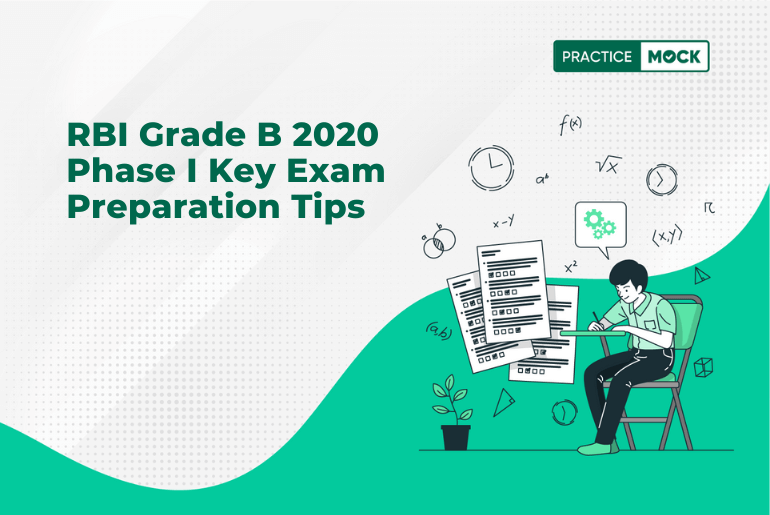RBI Grade B 2020 Preparation: Embarking on the journey to crack the Reserve Bank of India (RBI) Grade B 2020 Phase I exam requires a strategic approach and focused preparation. This competitive examination demands proficiency in various subjects, and success hinges on a well-rounded study plan. In this article, we’ll delve into key exam preparation tips to guide aspirants in their quest to excel in RBI Grade B Phase I.
Understanding the Exam Pattern: Blueprint for Success
The first step in effective preparation is understanding the exam pattern. RBI Grade B Phase I consists of objective-type questions covering quantitative aptitude, reasoning ability, English language, and general awareness. Knowing the weightage of each section and the overall structure aids in devising a targeted study plan.
Comprehensive Study Material: Choosing Wisely
Selecting the right study material is crucial. Opt for reputable books and online resources that cover the syllabus comprehensively. Books like “Quantitative Aptitude for Competitive Examinations” by R.S. Aggarwal and “A Modern Approach to Verbal & Non-Verbal Reasoning” by R.S. Aggarwal are go-to choices for quantitative aptitude and reasoning sections.
Strategic Time Management: Maximizing Efficiency
Time is of the essence in competitive exams. Devise a study schedule that allocates ample time to each section based on your strengths and weaknesses. Practice time-bound mock tests regularly to enhance speed and accuracy. This strategic approach ensures you complete the paper within the stipulated timeframe.
Focused Approach to Quantitative Aptitude: Concepts and Practice
Quantitative aptitude is a significant section in RBI Grade B Phase I. Focus on mastering core mathematical concepts such as percentages, ratios, and arithmetic. Practice regularly with a variety of problems to enhance problem-solving skills. Utilize shortcut techniques to tackle complex calculations swiftly.
Sharpening Reasoning Ability: Logical Thinking Skills
The reasoning ability section tests logical thinking skills. Practice puzzles, seating arrangement problems, and analytical reasoning regularly to hone your abilities. Develop a systematic approach to solving problems, as this section often rewards those with a structured and logical mindset.
Enhancing English Language Proficiency: Reading and Vocabulary Building
The English language section demands proficiency in grammar, vocabulary, and comprehension. Regular reading habits, including newspapers and editorials, enhance comprehension skills. Brush up on grammar rules and focus on vocabulary building. Solve previous years’ question papers to understand the question patterns.
Staying Updated with General Awareness: Current Affairs Mastery
General awareness is a dynamic section that requires constant updates on current affairs. Follow reputable newspapers, magazines, and online platforms for daily news. Make concise notes on important events, economic updates, and banking awareness. Regularly revise these notes to stay well-prepared.
Mock Tests and Previous Years’ Papers: Real-Time Practice
Mock tests and previous years’ papers are invaluable tools in your preparation journey. They offer insights into the exam pattern, question formats, and time management strategies. Analyze your performance in mock tests to identify weak areas and focus on improving them.
Healthy Lifestyle: Mind and Body Wellness
While rigorous preparation is essential, maintaining a healthy lifestyle is equally important. Ensure you get adequate sleep, stay hydrated, and incorporate breaks into your study schedule. A healthy mind and body contribute to enhanced concentration and overall well-being during the exam.
Last-Minute Revision: Cautious and Confident
In the days leading up to the exam, focus on concise revision. Review important formulas, rules, and notes. Avoid learning new topics at the last minute. Stay calm, confident, and trust in your preparation. A positive mindset is crucial for performing well in the RBI Grade B Phase I exam.
Conclusion: Success Awaits with Diligent Preparation
In conclusion, cracking the RBI Grade B 2020 Phase I exam requires diligent preparation and a strategic approach. By understanding the exam pattern, choosing the right study material, and adopting focused preparation strategies for each section, aspirants can enhance their chances of success. Combine these efforts with a healthy lifestyle and a positive mindset, and success in the RBI Grade B Phase I exam becomes an achievable goal.
- Sign Up on Practicemock for Updated Current Affairs, Free Topic Tests and Free Mini Mocks
- Sign Up Here to Download Free Study Material
Free Mock Tests for the Upcoming Exams
- IBPS PO Free Mock Test
- RBI Grade B Free Mock Test
- IBPS SO Free Mock Test
- NABARD Grade A Free Mock Test
- SSC CGL Free Mock Test
- IBPS Clerk Free Mock Test
- IBPS RRB PO Free Mock Test
- IBPS RRB Clerk Free Mock Test
- RRB NTPC Free Mock Test
- SSC MTS Free Mock Test
- SSC Strenographer Free Mock Test
- GATE Mechanical Free Mock Test
- GATE Civil Free Mock Test
- RRB ALP Free Mock Test
- SSC CPO Free Mock Test
- AFCAT Free Mock Test
- SEBI Grade A Free Mock Test
- IFSCA Grade A Free Mock Test
- RRB JE Free Mock Test
- Free Banking Live Test
- Free SSC Live Test



